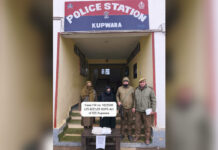X: @the_news_21
New Delhi: Union Home Minister Amit Shah on Thursday, while releasing the book ‘J&K and Ladakh Through the Ages’ on Thursday, remarked that Jammu and Kashmir could be named after sage Kashyap. He said that the country has gained independence and that the right things should be presented to the people.
He criticized the provisions of Article 370 and Article 35A, saying they hindered India’s unity. He said there was no majority in the Constituent Assembly on these articles and as a result, they were made temporary. According to Shah, these provisions promoted separatism in Jammu and Kashmir, severing its ties with the rest of India and fostering terrorism.
However, he said, the Modi government’s removal of Article 370 had diminished terrorism and paved the way for development in the region. “Article 370 and 35A, were the articles that stopped the unison of Jammu and Kashmir with the rest of the country… PM Modi’s strong resolution abrogated Article 370… This began the development of Jammu and Kashmir along with the rest of the country.
Shah also talked about the cultural significance of Jammu and Kashmir in India’s history. He said that the region’s connection to Indian culture is evident through references to Adi Shankaracharya, the Silk Route and Hemish Matha, which showcase Kashmir’s historical importance. Shah added that languages like Kashmiri, Dogri, Balti, and Jhankari were officially recognised, thanking Prime Minister Modi for supporting the initiative.
He further said that India is unique in having cultural, rather than geopolitical, borders. He added that cultural unity spans from Jammu and Kashmir to Kanyakumari and is rooted in centuries of shared heritage. The book, he said, highlights the presence of Indian culture throughout Jammu and Kashmir and stresses that India’s border is defined by cultural tradition, not just geography.
Shah reiterated that Jammu and Kashmir has always been, and will remain, an integral part of India. He cited the destruction of temples in Ladakh and the use of Sanskrit in Jammu and Kashmir as evidence of the region’s deep connection to Indian civilization. The book also addresses mistakes made post-independence, which have since been rectified.








I have learn some just right stuff here. Definitely value bookmarking for revisiting. I wonder how so much attempt you place to create this type of wonderful informative site.
A formidable share, I just given this onto a colleague who was doing somewhat analysis on this. And he in fact bought me breakfast as a result of I found it for him.. smile. So let me reword that: Thnx for the deal with! However yeah Thnkx for spending the time to debate this, I really feel strongly about it and love reading extra on this topic. If attainable, as you change into expertise, would you thoughts updating your blog with more particulars? It’s highly helpful for me. Big thumb up for this blog put up!
You made some clear points there. I looked on the internet for the topic and found most individuals will consent with your blog.
Heya i am for the first time here. I came across this board and I find It truly useful & it helped me out much. I hope to give something back and help others like you helped me.
Good day very cool blog!! Guy .. Excellent .. Superb .. I will bookmark your blog and take the feeds also…I am glad to seek out so many useful info right here within the submit, we’d like work out extra strategies on this regard, thanks for sharing. . . . . .
This is really attention-grabbing, You’re an overly skilled blogger. I’ve joined your rss feed and look ahead to in the hunt for more of your great post. Additionally, I have shared your website in my social networks!
专业构建与管理谷歌站群网络,助力品牌实现全域流量的强势增长。谷歌站群
Very superb information can be found on web site. “I said I didn’t want to run for president. I didn’t ask you to believe me.” by Mario M Cuomo.
Dead indited content, appreciate it for information .
You have brought up a very wonderful points, appreciate it for the post.
Thanks for sharing excellent informations. Your website is so cool. I’m impressed by the details that you have on this blog. It reveals how nicely you understand this subject. Bookmarked this web page, will come back for extra articles. You, my friend, ROCK! I found just the info I already searched everywhere and simply could not come across. What a perfect web site.
excellent issues altogether, you simply won a new reader. What would you suggest about your put up that you just made a few days ago? Any positive?